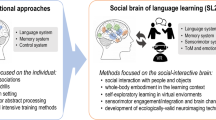Abstract
This paper discusses the notion of language games as cultural practices in children’s early linguistic and socio-cognitive development. First, we trace the emergence of this concept in Jerome Bruner’s experimental and theoretical work at Oxford University in the 1960s, work that was informed by the thinking of Wittgenstein and Austin, amongst others. Second, we provide a systematic historical account of how Bruner has influenced more recent research traditions in developmental psychology, especially in the field of social cognition. Finally, we hone in on one specific approach within this field developed by the Laboratory for Developmental and Educational Studies in Psychology at the University of Milano Bicocca.
Similar content being viewed by others
References
Austin, J. L. (1962). How to do things with words. Oxford: Clarendon Press.
Bruner, J. S. (1975). The ontogenesis of speech acts. Journal of Child Language, 2, 1–19.
Bruner, J. S. (1980). Under five in Britain. Oxford: Wiley-Blackwell.
Bruner, J. S. (1983). Children’s talk: Learning to use language. New York: Norton.
Bruner, J. S. (1984). In search of mind: Essays in autobiography. New York: Harper & Row.
Bruner, J. S. (1990). Acts of meaning. Cambridge: Harvard University Press.
Dunn, J. (1988). The beginnings of social understanding. Cambridge: Harvard University Press.
Fogel, A. (1993). Developing through relationships. Chicago: University of Chicago Press.
Grazzani, I., Ornaghi, V., Agliati, A., & Brazzelli, E. (2016a). How to foster toddlers’ mental-state talk, emotion understanding and prosocial behavior: A conversation-based intervention at nursery school. Infancy, 21(2), 199–227. https://doi.org/10.1111/infa.12107.
Grazzani, I., Ornaghi, V., & Brockmeier, J. (2016b). Conversation on mental states at nursery: Promoting social cognition in early childhood. European Journal of Developmental Psychology, 13(5), 563–581. https://doi.org/10.1080/17405629.2015.1127803.
Grazzani, I., Ornaghi, V., Conte, E., Pepe, A. & Caprin, C. (2018c). The relation between emotion understanding and theory of mind in children aged 3 to 8: The key role of language. Front. Psychol. 9:724. https://doi.org/10.3389/fpsyg.2018.00724
Groppo, M., Ornaghi, V., Grazzani, I., & Carubba, L. (1999). La psicologia culturale di Bruner (Bruner’s Cultural Psychology). Milano: Raffaello Cortina.
Hughes, C. (2011). Social understanding, social lives: From toddlerhood to the transition to school. New York: Psychology Press.
Meltzoff, A. N. (1995). Understanding the intentions of others: Re-enactment of intended acts by 18-month-old children. Developmental Psychology, 31(5), 838–850. https://doi.org/10.1037/0012-1649.31.5.838.
Ornaghi, V., & Grazzani, I. (2009). La comprensione della mente nel bambino (Children’s comprehension of the mind). Trento: Erickson.
Ornaghi, V., Brockmeier, J., & Grazzani Gavazzi, I. (2011). The role of language games in children’s understanding of mental states: A training study. Journal of Cognition and Development, 12(2), 239–259. https://doi.org/10.1080/15248372.2011.563487.
Tomasello, M. (1998). Social cognition and the evolution of culture. In J. Langer & M. Killen (Eds.), Piaget, evolution, and development. Mahwah: Erlbaum.
Tomasello, M., & Carpenter, M. (2007). Shared intentionality. Developmental Science, 10(1), 121–125. https://doi.org/10.1111/j.1467-7687.2007.00573.x.
Trevarthen, C. (1994). The self born in intersubjectivity: The psychology of an infant communicating. In U. Neisser (Ed.), The perceived self: Ecological and interpersonal sources of self knowledge (Emory Symposia in Cognition, pp. 121–173). Cambridge: Cambridge University Press. https://doi.org/10.1017/CBO9780511664007.009.
Tronick, E. (1989). Emotions and emotional communication in infants. American Psychologist, 44(2), 112–119. https://doi.org/10.1037/0003-066X.44.2.112.
Weir, K. (2015). The centenarian psychologists: As he approaches his 100th birthday, cognitive psychology pioneer Jerome S. Bruner reflects on the past, present and future of psychology. Monitor on Psychology, 46(5), 48–51.
Wittgenstein, L. (2009). Philosophical investigations (4th rev. Ed.). Chichester: Wiley. (Original work published in 1953).
Wood, D. J., Bruner, J. S., & Ross, G. (1976). The role of tutoring in problem solving. The Journal of Child Psychology and Psychiatry, 17, 89–100. https://doi.org/10.1111/j.1469-7610.1976.tb00381.x.
Vygotsky, L. S. (1978). Mind in society: The development of higher psychological processes. Cambridge: Harvard University Press.
Acknowledgments
This study was partly funded by a grant from the University of Milano-Bicocca (2017-ATE) awarded to Ilaria Grazzani.We are very grateful to dr. Veronica Ornaghi for sharing with us her precious reflections on the role of language games in children’s development of social cognition.
Author information
Authors and Affiliations
Corresponding author
Additional information
Publisher’s Note
Springer Nature remains neutral with regard to jurisdictional claims in published maps and institutional affiliations.
Rights and permissions
About this article
Cite this article
Grazzani, I., Brockmeier, J. Language Games and Social Cognition: Revisiting Bruner. Integr. psych. behav. 53, 602–610 (2019). https://doi.org/10.1007/s12124-019-09489-0
Published:
Issue Date:
DOI: https://doi.org/10.1007/s12124-019-09489-0



